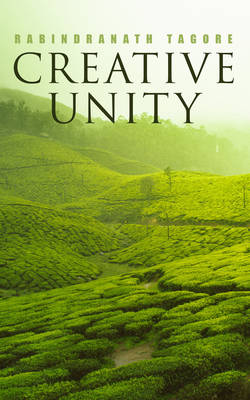Читать книгу Creative Unity - Rabindranath Tagore - Страница 7
На сайте Литреса книга снята с продажи.
III
ОглавлениеTable of Contents
Poetry and the arts cherish in them the profound faith of man in the unity of his being with all existence, the final truth of which is the truth of personality. It is a religion directly apprehended, and not a system of metaphysics to be analysed and argued. We know in our personal experience what our creations are and we instinctively know through it what creation around us means.
When Keats said in his "Ode to a Grecian Urn":
Thou, silent form, dost tease us out of thought,
As doth eternity,...
he felt the ineffable which is in all forms of perfection, the mystery of the One, which takes us beyond all thought into the immediate touch of the Infinite. This is the mystery which is for a poet to realise and to reveal. It comes out in Keats' poems with struggling gleams through consciousness of suffering and despair:
Spite of despondence, of the inhuman dearth
Of noble natures, of the gloomy days,
Of all the unhealthy and o'er-darken'd ways
Made for our searching: yes, in spite of all,
Some shape of beauty moves away the pall
From our dark spirits.
In this there is a suggestion that truth reveals itself in beauty. For if beauty were mere accident, a rent in the eternal fabric of things, then it would hurt, would be defeated by the antagonism of facts. Beauty is no phantasy, it has the everlasting meaning of reality. The facts that cause despondence and gloom are mere mist, and when through the mist beauty breaks out in momentary gleams, we realise that Peace is true and not conflict, Love is true and not hatred; and Truth is the One, not the disjointed multitude. We realise that Creation is the perpetual harmony between the infinite ideal of perfection and the eternal continuity of its realisation; that so long as there is no absolute separation between the positive ideal and the material obstacle to its attainment, we need not be afraid of suffering and loss. This is the poet's religion.
Those who are habituated to the rigid framework of sectarian creeds will find such a religion as this too indefinite and elastic. No doubt it is so, but only because its ambition is not to shackle the Infinite and tame it for domestic use; but rather to help our consciousness to emancipate itself from materialism. It is as indefinite as the morning, and yet as luminous; it calls our thoughts, feelings, and actions into freedom, and feeds them with light. In the poet's religion we find no doctrine or injunction, but rather the attitude of our entire being towards a truth which is ever to be revealed in its own endless creation.
In dogmatic religion all questions are definitely answered, all doubts are finally laid to rest. But the poet's religion is fluid, like the atmosphere round the earth where lights and shadows play hide-and-seek, and the wind like a shepherd boy plays upon its reeds among flocks of clouds. It never undertakes to lead anybody anywhere to any solid conclusion; yet it reveals endless spheres of light, because it has no walls round itself. It acknowledges the facts of evil; it openly admits "the weariness, the fever and the fret" in the world "where men sit and hear each other groan"; yet it remembers that in spite of all there is the song of the nightingale, and "haply the Queen Moon is on her throne," and there is:
White hawthorn, and the pastoral eglantine,
Fast-fading violets covered up in leaves;
And mid-day's eldest child,
The coming musk-rose, full of dewy wine,
The murmurous haunt of flies on summer eves.
But all this has not the definiteness of an answer; it has only the music that teases us out of thought as it fills our being.
Let me read a translation from an Eastern poet to show how this idea comes out in a poem in Bengali:
In the morning I awoke at the flutter of thy boat-sails,
Lady of my Voyage, and I left the shore to follow the beckoning waves.
I asked thee, "Does the dream-harvest ripen in the island beyond the blue?"
The silence of thy smile fell on my question like the silence of sunlight on waves.
The day passed on through storm and through calm,
The perplexed winds changed their course, time after time, and the sea moaned.
I asked thee, "Does thy sleep-tower stand somewhere beyond the dying embers of the day's funeral pyre?"
No answer came from thee, only thine eyes smiled like the edge of a sunset cloud.
It is night. Thy figure grows dim in the dark.
Thy wind-blown hair flits on my cheek and thrills my sadness with its scent.
My hands grope to touch the hem of thy robe, and
I ask thee—"Is there thy garden of death beyond the stars, Lady of my Voyage, where thy silence blossoms into songs?"
Thy smile shines in the heart of the hush like the star-mist of midnight.
